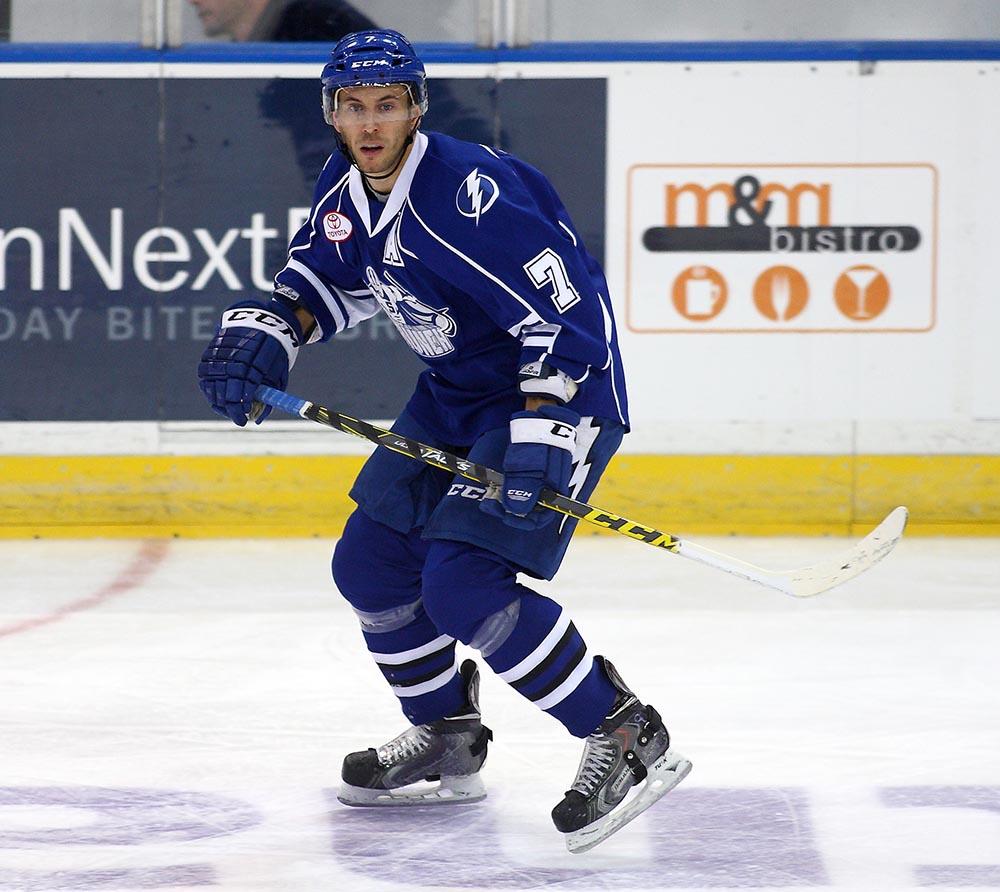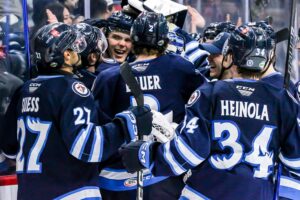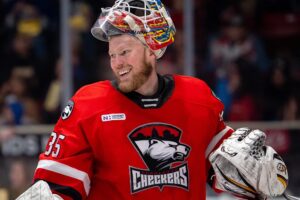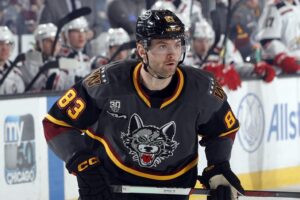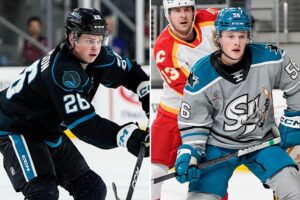by Dan D’Uva | AHL On The Beat Archive
Jeff Tambellini knows the feeling: Stanley Cup focused in the crosshairs. And missed.
Four years after he and his hometown Vancouver Canucks lost the Finals in seven games to Boston, Tambellini has joined the most recent runners-up, the Tampa Bay Lightning.
Inked to a one-year, two-way contract July 5 and assigned to Syracuse Sept. 27, Tambellini, 31, returns to North America after four years and two championships in Europe, one in Switzerland with the ZSC Lions in 2012 and the other in Sweden with the Växjö Lakers in April.
Why the decision to play in Europe after losing in the 2011 Stanley Cup Finals?
After every season you have to look back and see what kind of opportunities you have and some years you have good opportunities handed to you and other years, not so much. I had Bob Hartley, who is now with Calgary, and he came after me really hard right after the Finals and he wanted me to come to Switzerland with him and he gave me a lot of leadership, a big role and for me financially it was a good opportunity to make some guaranteed stuff and also to play a big role. And that’s what I had, I couldn’t just go over there just for a check. I mean, you see these guys who go over to Russia and they are looking to make some money for them and their family, but this was kind of an opportunity to give me both a real big hockey role, with an NHL coach over there, which I felt good about, and we were able to have some great success that first year.
Did you envision a longer stay in Vancouver?
The Vancouver situation was pretty wild because whenever you see a Stanley Cup contending team, a team that’s picked to win, you don’t always think that there’s holes in them. For some reason that team was so heavy towards the cap that, there was actually two big holes in their lineup. So when they called—I think they called two days before July 1 just because the way I was a free agent, I was able to sign before free agency even started—and realized that there was two gaping holes in their lineup. You just don’t really expect that because no one is really looking, thinking that a team like that has space. It was a great opportunity, I was able to play with some top players there right away and kind of establish and be able to hang on for the whole year and be able to play up the lineup, down the lineup, a lot of different positions, and give myself a chance to be there when it all came down to it at the end.
At that stage, what were your feelings about Vancouver, being part of your hometown team as it made its run?
Vancouver, that was something really special and it all kind of just came together at the same time. We knew that was going to be a good team. Just for me, it was: How can I be a part of this? This group? … In whatever way it could be. To be in my home town with that kind of excitement, with that kind of buzz, it was almost surreal. I know a lot of guys, they wait their whole careers to come into a year where it’s a career-defining year and for me that had the potential to just be a life-changing experience. To have Game 7 at home and having the chance to win the first Stanley Cup ever in Vancouver – it was an amazing experience without winning, but it had the potential to be something really special.
You have a few steps between here and another chance at the Stanley Cup. How does the Lightning organization enter the picture?
I think the older you get in your career, you’ve gone through a lot of things. I’ve gone through 10 full years and you’ve seen bad teams, you’ve seen good teams and I’ve had a chance to win twice in Europe. You realize that playing on bad teams isn’t a lot of fun. When you lose, nobody gets jobs. It’s a competitive business. There are only so many jobs out there. Nobody wants a guy who finished in the 30th spot. You look back at your career and you can have your years where you might have a great year individually and you were 20 games out of the playoffs. For me, now, it’s all about being able to win championships. I’ve been in the [Stanley Cup] Finals, won in Sweden, won in Switzerland. I’d love to win a Calder Cup, and hopefully have another chance to win a Stanley Cup. For me, the rest of my career, that’s my priority, positioning myself around a chance to win championships.
With what you have just said about winning championships, what has your American Hockey League experience meant to you to date?
There was a really young group of players in Bridgeport. For us as a group, there was probably about six or seven guys that we really had to establish that we could play. Whether we were going to win every night, we might not have had the team to win, but as an eclectic group with Kyle Okposo, Frans Nielsen, Blake Comeau and myself, we had to show that we could handle being first-line players, handle the minutes. We might not have been able to win, but as young players it was really important for us to establish who we were as players. As 30, 31 [years old], it’s all about: Can you get it done? And that’s the different part. It would be a really cool opportunity to come back into the league as a veteran guy and looking to do both. Not only contribute offensively and be the 200-foot guy that they want you to be, but also be part of the leadership group that is pushing to win championships.
It’s been seven years since you played primarily in the AHL. In the brief period you’ve had with Syracuse, what do you sense are differences in the league, then and now?
The league is so different. When we came in, it was still kind of the old school. Now, there’s a lot of youth. The game is different. The way the game is played now, it’s played with such possession. In the offensive zone, especially in the defensive zone. The plays people are making has really changed the game. The rules are always going to push and dictate what the game is, but it really has taken a turn. Especially when you see this year the games being played at a different level skill-wise. You’re not seeing much dumping-and-chasing. If you can’t make plays, I don’t think you’re going to play, whether it’s here or the NHL.
As the player you are now, how do you fit in the AHL and on this team?
It’s good, I think, because the team we had in Europe, in Sweden, played the exact same style. It was a real possession style, so it’s been a nice transition to come and be able to play a similar style. I like the small rink.
That’s probably the biggest difference I think, is that I like to shoot the puck and get pucks towards the net, and in Europe there’s a lot of space. But there’s a lot of dead space, too. Not every shot in the zone is a good shot, where here pucks to the net are always good plays. There’s a big difference in that, but overall it’s still the same game, but the game is always going to evolve. I think in the last five years, this league especially has really made changes.
Who among the current Crunch players did you know prior to training camp?
Joey Mormina and I were rookies together in Manchester. So that was kind of a cool connection to come back. He’s filled out a little bit. He was a real gangly young kid when he first came up. He’s still got the size. He has really matured into a good leader. He’s done a great job. Guys, you can see – he really has respect in that room. It’s pretty impressive what he’s done for a big man in this league to kind of evolve from the old game to the new game and still be right in the mix. It’s really impressive.
Mormina is wearing an "A", Jonathan Marchessault is wearing an "A", Mike Blunden is wearing an "A", Mike Angelidis is your captain, and you’re wearing an "A". What does that mean to you?
I think anytime a coach puts a letter on your jersey it’s a really big honor. Especially for me coming into a new group. It’s something that I have always enjoyed. I was able to be a captain in Bridgeport for a majority of my time there. I think it’s a big role. There are so many young kids. I think on an American League team, there is such more responsibility to your teammates. In the NHL, everybody knows your leadership is on the ice. In the American League, you have such young impressionable players that you really have to take the time to think about what you’re doing on the ice, what you’re saying, your actions because guys are watching and soaking a lot of stuff up. It’s a big responsibility, but I’m looking forward to it.
Your line, in hockey years, is like three generations: You’re 31 years old, Jonathan Marchessault is almost 25 and Adam Erne is 20. What are your impressions of those two?
It’s funny because the first line I played with at Manchester was really similar to this. I was the 21-year-old kid who came in and played with Brad Smyth who was a proven, AHL dominant player and Noah Clarke who was a really shifty, mid-20s centerman and it is really similar to that. I think that’s the only way for the young guys to have a lot of success. Coming in their first year, you need to be with older players because three young guys can play well, I think, but when you have a veteran with you, they can show you how it gets done. They can help you play in the big situations, because you’re usually going to be trusted more with two veterans than you will be with two rookies.
Look at Adam Erne. He’s a strong player. He’s coming in his first year pro and he has a great chance to be a great pro. It’s just making sure that he learns how to do this game as fast as possible. He’s got a great start.
You take that quite seriously, the impact that you have on the young players. Why?
Because I had that with me. I was a young guy, came in, and had two guys grab me right away. Brad Smyth was that guy. He was a 31-year-old guy, a 50-goal scorer in the league. He helped me get to the NHL. I played maybe 15 games with him and had 25 points and I was in the NHL by November. It wasn’t all because of what I was doing. I had guys who were doing work and we were putting the effort in as a line. I was getting rewarded because I was going up and these veteran guys were really helping me a lot.
The impact on these guys – it’s important. If I didn’t have those guys, who knows if I would have ever played an NHL game. It’s just really important, not a pay it forward thing, but you’re out to help everybody have success, team success, and as veteran guys, if you do well here it’s a good situation for everybody.
You seem to enjoy it.
Yeah. That’s the only way it works. The longevity in this business is hard. To be able to stick around for 20 years… I’m in year 11 and you’re still pushing – pushing just as hard as you were on day one.

































